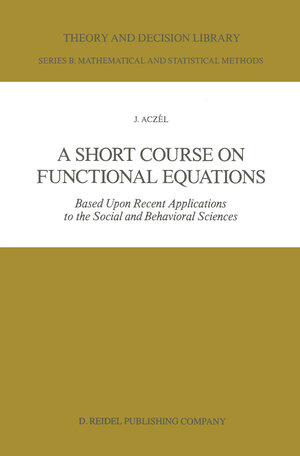
×
![Buchcover ISBN 9789400937499]()
'... this book is not only an impressive example how mathematics can be applied to problems arising in the social and behavioral sciences, but also on outstanding course on functional equations. This course is short, as the title says, but leads astonishingly far, since the material is presented very economically.
I am convinced that every reader will enjoy this book greatly.'
Zeischrift für Operations Research, June 1989.
I am convinced that every reader will enjoy this book greatly.'
Zeischrift für Operations Research, June 1989.
A Short Course on Functional Equations
Based Upon Recent Applications to the Social and Behavioral Sciences
von J. AczélRecently I taught short courses on functional equations at several universities (Barcelona, Bern, Graz, Hamburg, Milan, Waterloo). My aim was to introduce the most important equations and methods of solution through actual (not artifi cial) applications which were recent and with which I had something to do. Most of them happened to be related to the social or behavioral sciences. All were originally answers to questions posed by specialists in the respective applied fields. Here I give a somewhat extended version of these lectures, with more recent results and applications included. As previous knowledge just the basic facts of calculus and algebra are supposed. Parts where somewhat more (measure theory) is needed and sketches of lengthier calcula tions are set in fine print. I am grateful to Drs. J. Baker (Waterloo, Ont.), W. Forg-Rob (Innsbruck, Austria) and C. Wagner (Knoxville, Tenn.) for critical remarks and to Mrs. Brenda Law for care ful computer-typing of the manuscript (in several versions). A note on numbering of statements and references: The numbering of Lemmata, Propositions, Theorems, Corollaries and (separately) formulae starts anew in each section. If quoted in another section, the section number is added, e. g. (2.10) or Theorem 1.2. References are quoted by the last names of the authors and the last two digits of the year, e. g. Daroczy-Losonczi [671. 1 1. An aggregation theorem for allocation problems. Cauchy equation for single-and multiplace functions. Two extension theorems.



